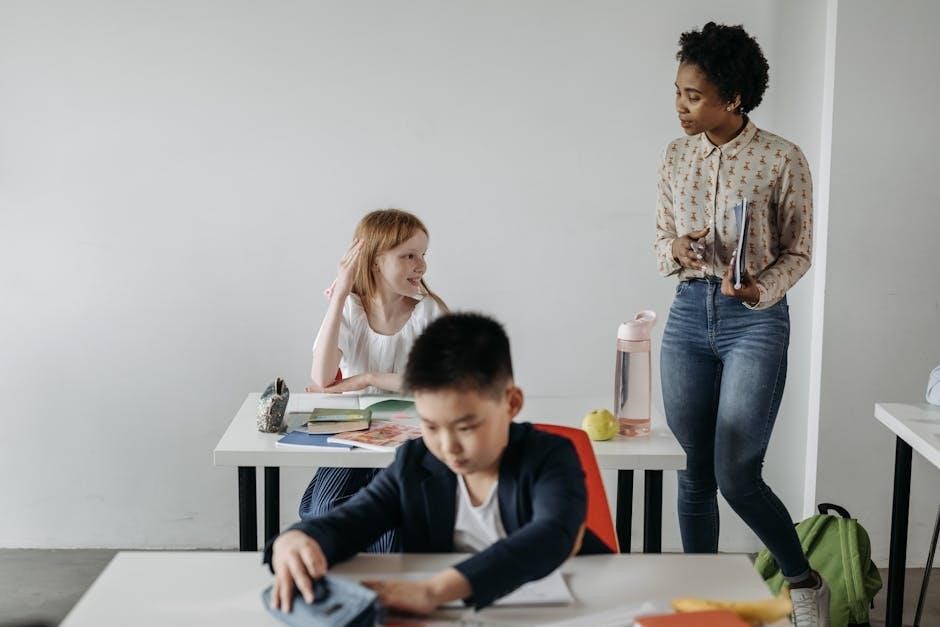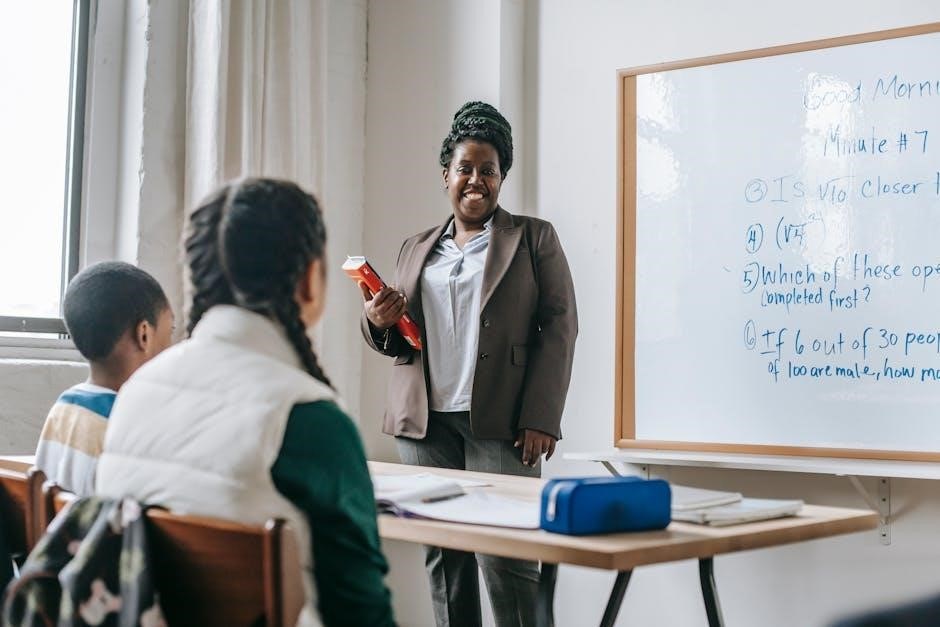Specialized Academic Instruction (SAI) is a research-informed approach tailored to meet diverse learning needs, emphasizing personalized strategies, technology integration, and data-driven methods to enhance student outcomes and academic success․
1․1․ Definition and Scope of Specialized Academic Instruction
Specialized Academic Instruction (SAI) refers to tailored educational strategies designed to meet the unique needs of diverse learners, ensuring equitable access to academic content․ It emphasizes personalized learning plans, technology integration, and data-driven assessments to foster student progress․ The scope of SAI encompasses a range of academic disciplines, leveraging research-based methods to address individual learning challenges․ By integrating innovative tools and collaborative approaches, SAI creates adaptive learning environments that cater to varied abilities, promoting academic achievement and long-term success for all students․
1․2․ Historical Development and Evolution of Specialized Instruction
Specialized instruction has evolved significantly over the past century, driven by advancements in educational research and changing societal needs․ Early efforts focused on addressing learning challenges through segregated programs, but modern approaches emphasize inclusivity and personalized learning․ The 20th century saw the rise of legal frameworks, such as the Individuals with Disabilities Education Act (IDEA), which mandated tailored instruction for students with special needs․ Today, specialized instruction integrates technology, data-driven strategies, and collaborative methodologies, reflecting a shift toward equitable and adaptive learning environments that cater to diverse student populations and promote academic success․
Key Components of Specialized Academic Instruction
Specialized Academic Instruction involves personalized learning plans, technology integration, and data-driven strategies to address diverse student needs, ensuring tailored support and adaptive teaching methods for optimal outcomes․
2․1․ Personalized Learning Plans and Their Implementation
Personalized Learning Plans (PLPs) are tailored to individual student needs, leveraging data from assessments and teacher collaboration․ These plans incorporate technology tools like Google Sheets for data analysis, enabling educators to track progress and adapt strategies․ AI-driven platforms, such as those discussed in academic writing, assist in customizing learning paths․ Implementation involves regular reviews and adjustments, ensuring alignment with student goals․ The DNA-V model, referenced in curriculum design, emphasizes adaptability, fostering engagement and accountability․ PLPs are integral to Specialized Academic Instruction, ensuring each student receives targeted support for optimal academic growth and success․
2․2․ Role of Technology in Enhancing Specialized Instruction
Technology plays a pivotal role in enhancing Specialized Academic Instruction by providing tools for personalized learning and data-driven decision-making․ Platforms like Google Sheets enable educators to analyze student data and refine instructional strategies․ AI and machine learning contribute to tailored learning experiences, while tools such as Connect PSHE offer research-informed curricula for diverse needs․ Technology also supports differentiated instruction, real-time feedback, and adaptive learning pathways․ These innovations ensure that educators can address individual student requirements effectively, fostering engagement and academic growth․

Specialized Instruction in Different Academic Disciplines
Specialized instruction adapts to various subjects, ensuring tailored strategies for STEM, language arts, and humanities, addressing diverse learning needs and fostering academic excellence across disciplines․
3․1․ STEM Education and Specialized Instructional Strategies
STEM education integrates science, technology, engineering, and mathematics, requiring specialized instructional strategies that emphasize hands-on learning, problem-solving, and critical thinking․ Educators use tailored approaches, such as project-based learning and virtual simulations, to engage students; Technology plays a pivotal role, with tools like AI and machine learning enhancing data analysis and visualization․ Personalized learning plans are adapted to meet individual needs, fostering deeper understanding of complex concepts․ These strategies not only enhance academic achievement but also prepare students for real-world applications, ensuring they are equipped with the skills to excel in emerging fields․
3․2․ Language Arts and Humanities in Specialized Learning
Specialized instruction in language arts and humanities focuses on tailored approaches to enhance literacy, critical thinking, and cultural understanding․ Educators use differentiated strategies, such as scaffolded reading and adaptive writing exercises, to meet diverse student needs․ Technology, like AI-driven tools, supports personalized feedback and language analysis․ The integration of diverse texts and multimedia resources fosters inclusivity and global perspectives․ These methods aim to cultivate not only academic proficiency but also a deeper appreciation for human experiences and cultural diversity, preparing students to communicate effectively and engage thoughtfully in an interconnected world․
Assessment and Evaluation in Specialized Academic Instruction
Assessment and evaluation in specialized instruction involve formative and summative methods to monitor progress, using data to refine strategies and ensure alignment with educational goals and outcomes․
4․1․ Formative and Summative Assessment Techniques
Formative assessments monitor student progress during learning, providing ongoing feedback to guide instruction․ Summative assessments evaluate student performance at the end of a lesson or course, measuring mastery of objectives․ Both techniques are essential in specialized academic instruction, ensuring alignment with educational goals․ Formative assessments, such as quizzes and class discussions, help identify areas needing improvement, while summative assessments, like exams, gauge overall understanding․ Data from these evaluations informs instructional strategies, promoting personalized learning and accountability․ This dual approach ensures continuous improvement and accurate measurement of student outcomes in specialized academic programs․
4․2․ Using Data to Refine Instructional Strategies
Data plays a pivotal role in refining instructional strategies within specialized academic instruction․ By analyzing formative and summative assessment results, educators can identify learning gaps and adjust teaching methods accordingly․ Tools like Google Sheets and AI-driven analytics enable efficient data interpretation, allowing for personalized interventions․ For instance, data revealing consistent struggles in a specific concept can prompt additional resources or alternative teaching approaches․ Regular data review ensures that instructional strategies remain aligned with student needs, fostering continuous improvement and enhanced academic outcomes․ This data-driven approach ensures that specialized instruction is both adaptive and effective, catering to diverse learner requirements․

Challenges and Solutions in Specialized Academic Instruction
Specialized academic instruction faces challenges like resource constraints and diversity issues, but solutions include AI-driven tools and professional development, enhancing accessibility and educational equity․
5․1; Addressing Diversity and Inclusivity in the Classroom
Addressing diversity and inclusivity in specialized academic instruction requires tailored strategies to support varied learning needs and cultural backgrounds․ Personalized learning plans and culturally responsive teaching practices ensure equitable access to education․ Additionally, integrating assistive technologies and universal design for learning (UDL) principles helps create an inclusive environment․ Teachers must receive professional development to effectively implement these strategies, fostering a classroom culture of acceptance and empathy․ By prioritizing diversity and inclusivity, educators can empower all students to thrive academically and socially, regardless of their abilities or backgrounds․
5․2․ Overcoming Resource Limitations in Specialized Programs
Specialized academic instruction often faces challenges due to limited resources, including funding, technology, and trained personnel․ To address this, schools can leverage partnerships with community organizations and utilize free or low-cost educational tools․ Technology, such as Google Sheets for data analysis and AI-driven platforms, can enhance efficiency and accessibility․ Professional development programs and collaborative planning among educators also help maximize available resources․ By fostering innovation and resource-sharing, schools can ensure high-quality specialized instruction despite financial or material constraints, ultimately supporting student success and program sustainability․

The Role of Educators in Specialized Academic Instruction
Educators play a vital role in adapting instruction to meet diverse needs, leveraging technology, and collaborating with students to foster academic and personal growth effectively․
6․1․ Professional Development for Specialized Instruction
Professional development is crucial for educators to master specialized instruction techniques, integrating AI and machine learning tools to enhance teaching strategies․ Continuous training ensures educators stay updated on evidence-based practices, fostering equitable and inclusive learning environments․
6․2․ Teacher-Student Collaboration in Specialized Learning
Teacher-student collaboration in specialized learning fosters personalized and engaging educational experiences․ Educators adapt instruction to individual needs, leveraging technology like AI tools to enhance understanding․ This partnership encourages active participation, critical thinking, and skill development, ensuring students achieve their academic goals effectively․

The Impact of Specialized Instruction on Student Outcomes
Specialized instruction significantly enhances academic achievement, fostering long-term success and social-emotional growth through personalized, data-driven strategies and technology integration, preparing students for future challenges and opportunities․
7․1․ Academic Achievement and Long-Term Success
Specialized Academic Instruction (SAI) significantly boosts academic achievement by tailoring learning to individual needs, fostering higher engagement and understanding․ Research shows that students receiving SAI often demonstrate improved performance in core subjects and better long-term educational outcomes․ Personalized strategies, such as adaptive technology and differentiated instruction, play a crucial role in enhancing academic success․ Additionally, SAI equips students with essential skills like critical thinking and problem-solving, preparing them for future academic and professional challenges․ The data-driven approach of SAI ensures that interventions are targeted and effective, leading to measurable improvements in student performance and readiness for lifelong learning․
7․2․ Social and Emotional Growth Through Specialized Instruction
Specialized Academic Instruction (SAI) fosters social and emotional growth by creating supportive learning environments that address individual student needs․ Personalized strategies, such as social-emotional learning (SEL) integration, help students develop self-awareness, self-regulation, and empathy․ Technology-enhanced tools provide interactive platforms for practicing communication and collaboration skills․ Educators collaborate with students to build confidence and resilience, ensuring a holistic approach to education․ SAI also encourages peer interactions and inclusive classrooms, promoting a sense of belonging and reducing social barriers․ By addressing emotional well-being, SAI equips students with essential life skills, contributing to their overall development and long-term success․
Future Trends in Specialized Academic Instruction
Future trends emphasize AI and machine learning, enabling personalized learning and real-time data analysis․ Globalization fosters cross-cultural learning opportunities, creating inclusive and dynamic educational environments․
8․1; Integration of Artificial Intelligence and Machine Learning
The integration of AI and machine learning revolutionizes specialized academic instruction by offering personalized learning experiences․ These technologies analyze student data to tailor lessons, identify learning gaps, and provide real-time feedback․ AI-powered tools, such as adaptive learning software, enable educators to create customized plans that cater to individual needs․ Additionally, machine learning algorithms can predict student performance, allowing for proactive interventions․ This technology enhances efficiency, engagement, and outcomes, making education more accessible and effective for diverse learners․ As AI continues to evolve, its role in education will expand, shaping the future of specialized instruction․
8․2․ Globalization and Cross-Cultural Learning Opportunities
Globalization has opened doors to cross-cultural learning, enabling students to engage with diverse perspectives and collaborate internationally․ Online platforms and digital tools facilitate access to global educational resources, fostering cultural exchange and understanding․ Specialized academic instruction can leverage these opportunities to prepare students for an interconnected world․ By integrating global content and promoting cross-cultural collaboration, educators can enhance students’ cultural competence and global citizenship․ This approach not only enriches learning experiences but also equips students with skills essential for success in a multicultural society․ Globalization thus serves as a catalyst for inclusive and transformative education․
Specialized Academic Instruction (SAI) is a vital approach to addressing diverse learning needs, ensuring personalized and inclusive education․ By leveraging technology, data-driven strategies, and cross-cultural opportunities, SAI fosters academic achievement and social-emotional growth․ Educators play a central role in implementing SAI effectively, requiring ongoing professional development and collaboration․ While challenges like resource limitations and inclusivity persist, innovative solutions and global perspectives offer promising avenues for improvement․ As education evolves, SAI will remain a cornerstone for preparing students to thrive in an interconnected, rapidly changing world․ Its impact on student outcomes underscores its enduring importance in modern education systems․
